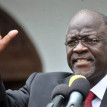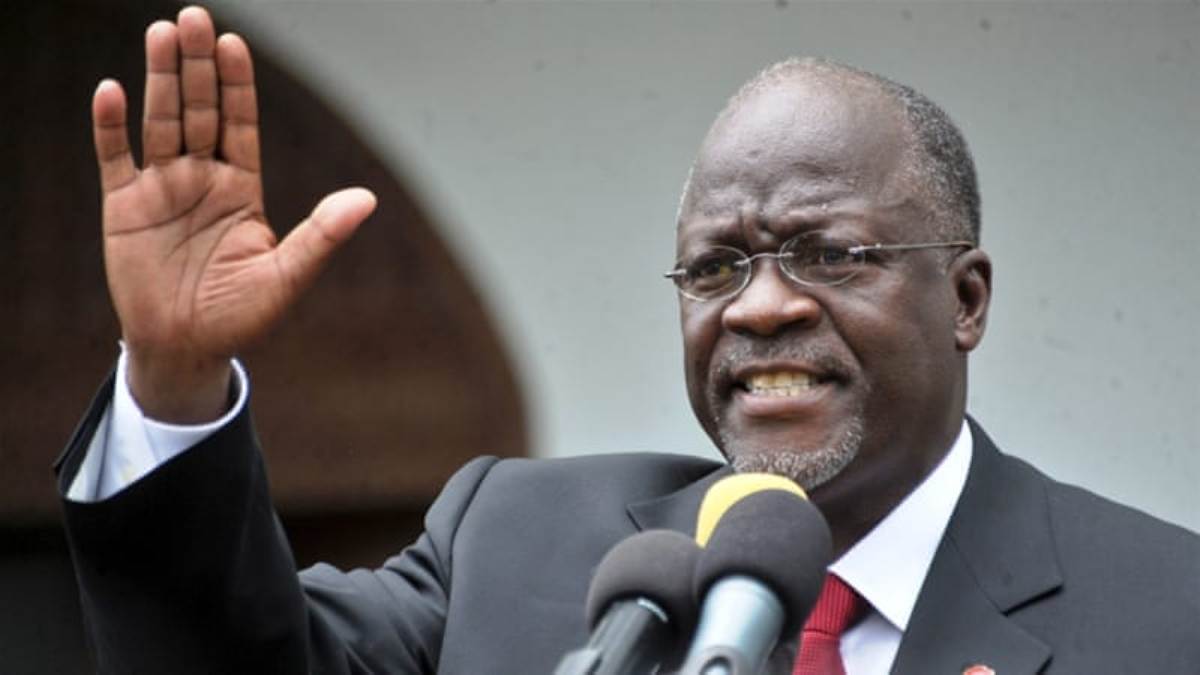

Tanzanian President John Magufuli came to power as a no-nonsense man of the people nicknamed The Bulldozer, but along with popular efforts to clean up graft, he has been accused of crushing dissent and stifling democracy.
The 61-year-old on Friday won a second term in office with a resounding 84 percent of the vote, after an election which the opposition said was riddled with irregularities.
Magufuli was first elected in 2015 on a fiery anti-corruption stance which endeared him to a population weary of graft scandals under his predecessor Jakaya Kikwete.
He quickly took wildly popular decisions, such as scrapping lavish independence day celebrations in favour of a street clean-up and banning unnecessary foreign trips for officials.
Several headline-grabbing incidents saw him showing up in person to demand why civil servants were not at their desks, while in one case officials were briefly jailed for lateness.
Dozens of officials implicated in corruption were suspended and the hashtag #WhatWouldMagufuliDo spread like wildfire on social media.
However his tendency to flout due process and act on a whim alarmed foreign allies over the squeezing of democracy in one of East Africa’s most stable nations.
“I think he is actually bulldozing everything, laws, human rights, everything,” said Aikande Kwayu, a Tanzanian political analyst.
At the start of his first term, Magufuli banned political rallies — saying it was time for work, and not politics — and cut live coverage of parliament sessions.
ALSO READ: We will reconvene plenary to address youth bills ― Gbajabiamila
A series of tough media laws were passed while arrests of journalists, activists and opposition members soared, and several opposition figures were killed.
Magufuli called for teenage mothers to be kicked out of schools, while rights groups slammed an unprecedented crackdown on the LGBT community under his rule.
Ringisai Chikohomero, a researcher with the Pretoria-based Institute for Security Studies (ISS) said that to Magufuli, “the end justifies the means”.
“He is a person who believes in what we call guided democracy. For Magufuli, the state and the president have the last say and he treats the citizens like children… there is no room for participatory consultation,” he said.
– ‘There is no Covid-19’ –
For many observers, Magufuli’s handling of the coronavirus crisis cast his leadership style into sharp relief.
He championed prayer instead of face masks, before stopping the publication of statistics in April when the country had recorded 509 cases and 16 deaths.
In May he revealed he had submitted a variety of fruit and animals to be tested for the virus and that a papaya, quail and goat tested positive, revealing “sabotage” at the national laboratory.
He has since claimed prayer saved the country from Covid-19.
“That’s why we are all not wearing face masks here. You think we don’t fear dying? It’s because there is no Covid-19,” he said.
In July, the country’s already tough online content laws were amended to ban publication “on deadly or contagious diseases” without official permission.
– ‘The leader we needed’ –
Magufuli’s supporters praise his crackdown on corruption, an energetic infrastructure drive as well as a shake-up in the mining industry which has seen him renegotiating contracts with foreign companies to improve the country’s share in its own resources.
“He is the kind of leader we needed at this time when corruption was rampant,” said 32-year-old restaurant owner Agnes Thomas.
“He created discipline among the civil servants.”
READ ALSO: Lagos community where potable water, good toilet, school, hospital don’t exist
Magufuli expanded free education, increased rural electrification and embarked on the construction of a key railway and a massive hydropower dam set to double electricity output in the country.
However aggressive taxation has squeezed the private sector, and worsened the environment for doing business.
“For a trader like me, Magufuli is not a good person because things are not easily moving. Tax officials are even more strict while businesses are not growing at all,” said Musa Hemed, who owns a shop selling building materials.
– Humble beginnings –
Magufuli was born in Tanzania’s northwestern Chato district, on the shores of Lake Victoria, where he grew up in a grass-thatched home, herding cattle and selling milk and fish to support his family.
“I know what it means to be poor,” he has often said.
He was awarded a doctorate in chemistry from the University of Dar es Salaam and also spent some time studying at Britain’s University of Salford.
Magufuli is a member of the ruling Chama Cha Mapinduzi (CCM) party, which has been in power since independence from Britain in the early 1960s.
A member of parliament since 1995 and a devout Roman Catholic, he held various cabinet portfolios, including livestock, fisheries and public works, where he earned the “Bulldozer” moniker.
Magufuli is married with five children.
[AFP]
The post Tanzania’s Magufuli: ‘Bulldozer’ who flattened freedoms appeared first on Vanguard News.
https://ift.tt/3oHkrlU by Rasheed Sobowale via Vanguard News Albert Einstein Fools of Fortune
Comments
Post a Comment